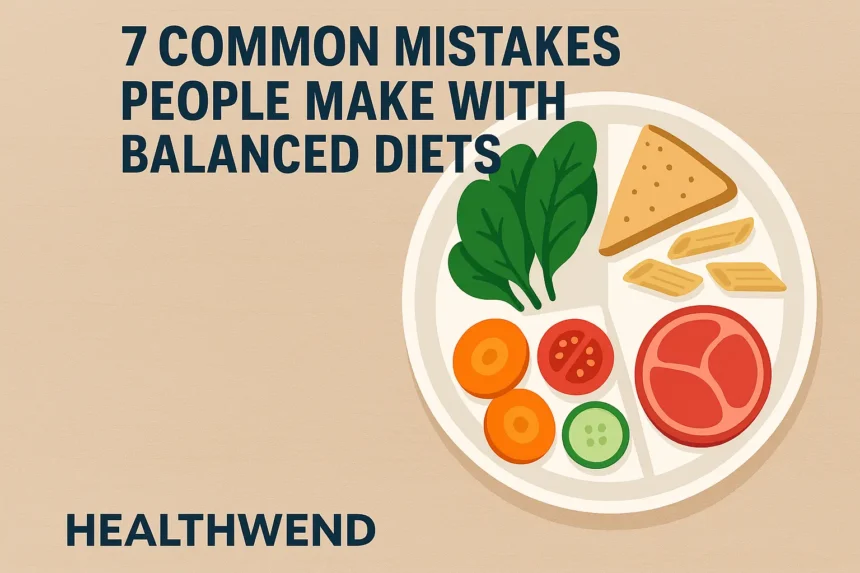A balanced diet is the foundation of good health — but even with the best intentions, many people unknowingly make mistakes that prevent them from reaching their wellness goals.
These balanced diet mistakes can lead to nutrient deficiencies, weight gain, or low energy levels. Let’s explore these common errors and learn how to fix them.
1. Overloading on Processed “Healthy” Foods
Not all foods labeled “healthy” are truly beneficial. Many protein bars, cereals, or packaged snacks marketed as “low-fat” or “sugar-free” are still high in refined carbs, artificial sweeteners, and preservatives.
Fix: Choose whole, unprocessed foods like fruits, vegetables, nuts, and whole grains.
2. Ignoring Portion Sizes
Even healthy foods can lead to weight gain if eaten in excess. A common mistake is filling the plate with too much grain or protein while neglecting vegetables.
Fix: Follow the plate method — half vegetables/fruits, one-quarter lean protein, and one-quarter whole grains.
3. Not Getting Enough Protein
Protein helps build and repair tissues, supports metabolism, and keeps you full longer. Many diets, especially plant-based ones, unintentionally fall short on protein.
Fix: Include sources like lean meat, fish, eggs, legumes, tofu, and nuts in every meal.
4. Avoiding Fats Completely
Healthy fats are essential for brain function, hormone production, and vitamin absorption. Cutting them out completely can harm your health.
Fix: Include good fats from olive oil, avocado, nuts, seeds, and fatty fish.
5. Lack of Variety in Food Choices
Eating the same “healthy” meals every day may cause nutritional gaps.
Fix: Rotate your fruits, vegetables, proteins, and grains to ensure a wide range of vitamins and minerals.
6. Drinking Calories Without Realizing
Smoothies, fruit juices, and fancy coffee drinks may contain hidden sugars and excess calories.
Fix: Drink water, unsweetened tea, or black coffee. If having smoothies, make them with whole fruits and no added sugar.
7. Ignoring Micronutrients
While focusing on carbs, protein, and fat, people often forget about vitamins and minerals, which are vital for overall health.
Fix: Eat a variety of colorful vegetables and fruits to naturally boost micronutrient intake.
Balanced Diet Mistakes – Quick Fix Table
| Mistake | Quick Fix |
|---|---|
| Too many processed foods | Choose whole, fresh foods |
| Oversized portions | Use smaller plates, follow plate method |
| Low protein intake | Add lean protein to every meal |
| Avoiding fats completely | Include healthy fats in moderation |
| Repetitive meals | Mix up your food choices |
| High-calorie drinks | Switch to water or unsweetened beverages |
| Micronutrient neglect | Eat colorful veggies and fruits |
Internal Link Suggestions
- Healthy Breakfast Smoothie Recipes to Boost Your Energy
- How to Build a Balanced Meal Plate: Step-by-Step Guide
- Balanced Diet Smoothie Recipes for Busy Mornings
FAQs – Balanced Diet Mistakes
Q1: What’s the most common balanced diet mistake?
A: Over-relying on processed “healthy” foods and ignoring whole, fresh options.
Q2: Can skipping fats help with weight loss?
A: No, your body needs healthy fats for nutrient absorption and hormone function.
Q3: How do I know if my diet is balanced?
A: Check if you have the right proportions of carbs, protein, fat, and a variety of colorful vegetables daily.
Q4: Can I fix my diet mistakes quickly?
A: Yes, by making small adjustments like adding more vegetables, reducing processed foods, and including protein at every meal.
Q5: Are smoothies healthy for a balanced diet?
A: Yes, if made with whole fruits, vegetables, and no added sugar.
Conclusion
Avoiding these balanced diet mistakes can transform your health, energy, and overall well-being. By focusing on whole foods, proper portions, and variety, you’ll not only meet your nutrient needs but also enjoy your meals more.
Start today — small changes lead to big results over time.
📌 Call to Action:
If you found this article useful, share it with friends and explore more healthy eating tips on Healthwend.


